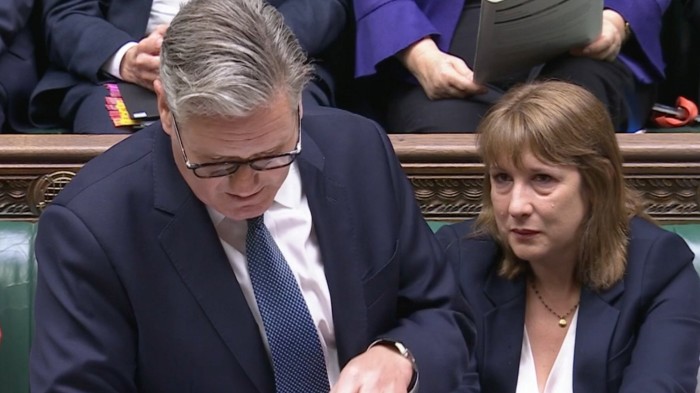Unlock the Editor’s Digest for free
Roula Khalaf, Editor of the FT, selects her favourite stories in this weekly newsletter.
UK government bonds and the pound fell sharply after Sir Keir Starmer declined to back a tearful Rachel Reeves during Prime Minister’s Questions, following Labour’s dramatic gutting of its welfare bill.
Starmer refused to say that the chancellor would remain in her post in a combative exchange on Wednesday with Conservative leader Kemi Badenoch following Labour’s chaotic ditching of a planned £5bn in savings.
Gilts slumped as investors grew increasingly nervous about the UK public finances, pushing the 10-year yield up 0.18 percentage points to 4.64 per cent, close to the biggest one-day rise in borrowing costs since the market fallout from Liz Truss’s unfunded tax cuts three years ago. The pound dropped 1.1 per cent against the dollar and 0.8 per cent against the euro.
Mike Riddell, a fund manager at Fidelity International, said investors were fearful that, if the chancellor were replaced, there was a greater risk that the government’s fiscal rules would be “changed or ditched [implying] even bigger deficits and issuance”.
Reeves, who sat beside Starmer during PMQs on Wednesday and had entered the chamber looking upset, appeared to shed a tear after the prime minister stopped short of giving her his full backing when asked about her future by Conservative leader Badenoch. The prime minister’s press secretary later said Reeves had Starmer’s “full backing” and was “going nowhere”.
In the House of Commons, Starmer, who has previously publicly backed Reeves, said he was “thankful” for the chancellor but the absence of full-throated support increased speculation that her position was under threat.
Reeves has become a target for rebel anger over Labour’s handling of the welfare reforms.
Badenoch said the chancellor was being used by Starmer as “a human shield for his incompetence” and said that she looked “miserable”.
Conservative MP Robert Jenrick, the shadow justice minister who is widely seen as harbouring his own leadership ambitions, said on Wednesday that it was “time for Reeves to go”.
“Rachel Reeves’ benefit bill is dead, and so is her career,” Jenrick said on a video on X. “She’s lost the confidence of the markets and now it seems she’s lost the confidence of the prime minister too. It’s time for Reeves to go.”
As PMQs ended, Reeves was ushered out of the chamber by her sister and fellow MP, Ellie Reeves, who is chair of the Labour party. She appeared to squeeze the chancellor’s hand as she guided her from the chamber.
The spokesperson said the prime minister had previously said Reeves would serve as chancellor for the whole parliament. “He doesn’t have to repeat [that] every time.”
Asked whether Reeves had offered her resignation, the spokesperson said: “No.” She said Reeves and Starmer were getting on with delivering reform.
A spokesperson for Reeves said: “It’s a personal matter, which — as you would expect — we are not going to get into. The chancellor will be working out of Downing Street this afternoon.”
A spokesperson for Badenoch said: “The ‘personal matter’ doesn’t cover it. I think we should find out what’s going on.”
Asked what markets might make of the chancellor appearing to cry in the House of Commons, the Labour spokesperson said: “We don’t comment on markets.”
Labour’s U-turn late on Tuesday managed to stop its welfare reform bill from being defeated, but required the prime minister to gut it of any measures that may have led to a net saving in the long run.
Reeves’ position is of huge interest to investors as she has pledged to abide by strict fiscal rules. But she is operating with minimal fiscal headroom and the government’s U-turn on welfare has blown a £5bn hole in her plans.
“There is a risk that a sell-off in gilts becomes self-reinforcing, if market fiscal worries are left unchecked,” said Mark Dowding, chief investment officer for fixed income at RBC BlueBay Asset Management.
There is growing speculation Reeves will need to increase taxes at the autumn Budget or pare back Labour’s spending plans — something that has become more challenging with backbench MPs increasingly aware of the sway they can exercise over the government’s agenda.
Read the full article here




